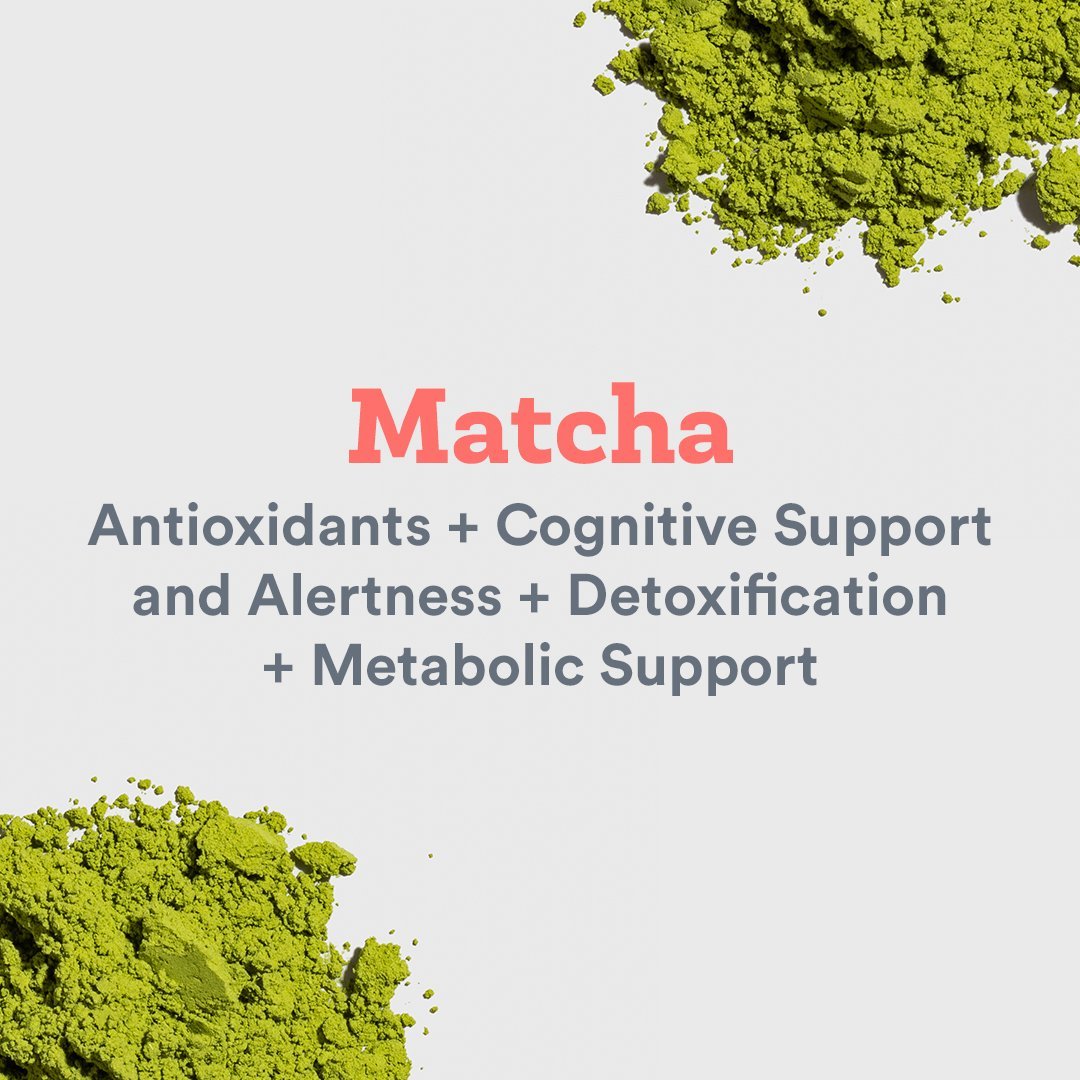
Scientific/Latin name: Camellia sinensis
Also known as: Green Tea Powder, Fine Powder Tea
Native to: China and Japan
Parts used: Leaves
Top benefits: Antioxidant-Rich, Cognitive Support, Detoxification, Metabolic Support, Cancer Fighting Properties and bringing a sense of "Alert-Calm"

Matcha, the ancient superfood drink
You’re seeing it in coffee shops and in the cups of all your coworkers; this strange drink with its bright green color must have some kind of mind-altering superpower, because it seems like everyone is consuming it.
Don’t feel left out. Matcha green tea isn’t a new trend, but rather a centuries-old powdered green tea that boasts some pretty amazing benefits. We’ll explain exactly what it is, the health benefits of matcha, and why you should consider swapping your morning cup of joe for a matcha latte.
History of Matcha
For centuries, monks have been drinking green tea to maintain a state of “mindful alertness” during long periods of meditation. In Japanese culture, matcha is used in traditional tea ceremonies, and in Okinawa, Japan, home to some of the world’s healthiest and longest living people, it’s common practice to consume green tea daily.
Western culture is catching on, but only recently have we begun to research and reveal the numerous benefits of this jade-green, anti-aging, wellness-promoting drink, including its effects on brain function and cancer.
What Is Matcha?
Matcha is a high-grade, concentrated, powdered form of green tea. Grown from shaded tea bushes, the tea leaves used for matcha are protected from the sunlight’s nutrition-leaching effects. This results in significantly higher levels of antioxidants and other nutrients than regular green tea. Moreover, because matcha is made by grinding the entire tea leaf into a matcha powder, all of these nutrients and fiber end up in the cup, not the tea bag.
Health Benefits of Matcha
Need a little more convincing that you’ve met your perfect match-a? Drinking a cup of matcha can give your body superpowers, or at least some really impressive health-protective benefits that can leave you feeling super-human.
Antioxidant Properties
The secret behind matcha’s health and longevity-promoting power is found in its high levels of catechins, a potent group of polyphenols with powerful antioxidant activity. These are also found in foods such as cacao, red wine, apples and raspberries.
Matcha also contains vitamin C, a natural antioxidant that can also help support your body with its natural health-promoting properties.
Antioxidants have been shown to help protect against various metabolic diseases, heart disease, brain disorders and age-related syndromes, as they help the body combat cellular damage caused by free radicals, also known as oxidative stress.
Free radicals (reactive chemicals containing oxygen) are produced by the body naturally as a result of normal metabolism, as well as in response to external stressors like UV light, pollution, and cigarette smoke. The cell damage caused by free radicals is replicated when new cells are created.
Luckily, antioxidants can shield your cells from free radical damage. They offer up one of their electrons to a free radical to neutralize it, and thereby reduce its ability to cause damage.
Matcha has been found to be the highest food source of catechins. Researchers compared matcha and regular green tea and have found that the concentration of catechins available from drinking matcha is significantly greater than that for other green teas. Moreover, research suggests that catechins, with their anti-inflammatory properties, can help fight inflammation caused by the body’s protective response to cell damage.
Alert-calm
Matcha is often described as promoting a sense of calm, attentive wakefulness, a benefit which has been hailed dating back to the Zen monks, but only more recently researched. The two compounds responsible are caffeine and L-theanine, and it’s the combination of the two that makes tea unique from any other drink.
L-theanine is an amino acid found almost exclusively in tea leaves (and is particularly concentrated in shade-grown teas such as matcha) that impacts nerve impulses in the brain. It raises levels of brain chemicals that promote relaxation and can help with sleep, while it reduces levels of other chemicals that are linked to stress and anxiety.
L-theanine also promotes alpha brain waves, which have been found to enhance focus, creativity and relaxation, but without inducing drowsiness - a state of “wakeful relaxation” similar to the state of mind experienced when meditating. These alpha waves also moderate the stimulating effect of the caffeine in matcha, allowing the body to sustain a feeling of alertness and concentration over a longer period of time than with caffeine alone, without the caffeine crash associated with coffee. For example, one study demonstrated that L-theanine had a significant effect on enhanced activity of alpha waves, descending heart rate, and improved attention and reaction time in healthy adults with high anxiety.
Bottom line: the caffeine content in matcha is lower than the amount of caffeine in a cup of coffee, but because matcha contains these mind-centering ingredients, you can get better, more clean-burning mental and physical energy from a cup of matcha tea than you might from a cup of coffee.

Cognitive function
Your favorite energy drink can sometimes leave you with heart palpitations and sweaty palms while doing nothing to improve your ability to focus. Why not swap it out for mind-focusing matcha?
As noted above (see “Alert-Calm”), the combination of caffeine and L-theanine and the effect of these two compounds on alertness makes tea unique from any other drink. A number of studies have demonstrated the effects of L-theanine in combination with caffeine on cognition and learning ability. Improvements were found in numerous measures, including: attention, reaction time, alertness, speed and accuracy of performance when multi-tasking, reduced mental fatigue and overall alertness. (1, 2, 3, 4, 5)
Thanks to the dynamic duo of caffeine and L-theanine in matcha, you can think clearly, stay focused, and regain your edge, all without the side effects that can come with the questionable ingredients in energy drinks.
Metabolism & weight loss
One of the most impressive health benefits of matcha tea is its ability to support your metabolism and manage weight, a goal that is a foundational part of a healthy lifestyle.
Science shows that matcha is a fat-burning functional food. A number of studies indicate that catechin-rich green tea can help increase energy expenditure, metabolize fat and promote weight loss.
By simply adding this type of green tea to your daily routine, you can check off another box in your healthcare routine and better support your metabolic goals.
Using the ceremonial grade matcha found in JOYÀ products, you can also keep your daily caloric intake under control. One scoop of our Focus Matcha Superblend powder is just 15 delicious calories.
Detoxification
The body can become congested with toxins and irritants. This can cause bodily function to become unbalanced and stall. But you can help make it right with matcha.
Matcha gets its super deep, bright green colour from its high levels of chlorophyll, a pigment responsible for the absorption of light in the process of photosynthesis in which plants create energy. Because matcha is shade-grown, large amounts of chlorophyll and other nutrients are concentrated in the leaves.
Chlorophyll increases production of hemoglobin (a protein that gives blood its red colour), which in turn delivers oxygen and other nutrients throughout the body and helps the body cleanse itself. Interestingly, chlorophyll’s chemical structure is remarkably similar to that of our hemoglobin. Chlorophyll also increases enzymes key to detoxification processes in the liver, thereby promoting the elimination of harmful toxins from the body.

Cancer fighting
Tea plant cultivation dates back over 5000 years, and originally its leaves were used medicinally. More recently, green tea has received attention for its potential anti-cancer effects, with an extensive and growing body of research, including epidemiological, clinical, and experimental studies, showing that consumption of green tea appears to help prevent and fight this chronic disease. A number of human observational studies have demonstrated a decreased incidence of cancers, although the evidence is inconclusive. (1, 2, 3)
According to findings from numerous cell culture and animal studies, a number of mechanisms are thought to explain how compounds in green tea act against cancer, including antioxidant activity, inhibition of signalling pathways, regulating cell lifecycles and modulating the immune system. Studies have shown the anticancer activities of Epigallocatechin gallate (EGCG), matcha’s most abundant catechin, demonstrating its ability to inhibit the migration of bronchial tumor cells, and to inhibit cancer cell growth and survival, including the development of secondary malignant growths. L-theanine has also been shown to have an anti-cancer effect, helping to suppress cancer cell migration and invasion, inhibit cell growth and promote cell destruction. (4, 5, 6)
Matcha: A Higher Quali-Tea
If you’re hesitant to try a green drink, don’t be. Matcha has a light flavor that is earthy and slightly sweet and can even be found in some ice cream!
Now you’re in the know. The green tea leaves used to make matcha powder are packed with health-supporting properties that help you think clearly and stay focused, and provide energy without jitters or a crash.
Adding matcha to your life can also help protect your cells from oxidative stress and promote a calm alertness. It’s easy to matcha your way to better health.
The health research presented in this article is for informational use only. It is not a replacement for professional health advice and should not be construed as a recommendation of specific products. The products sold on this website are not intended to diagnose, treat, cure, or prevent any disease. This information does not provide dosage or format recommendations or possible drug interactions, and accordingly, should be used with the advice of a qualified health care practitioner.
